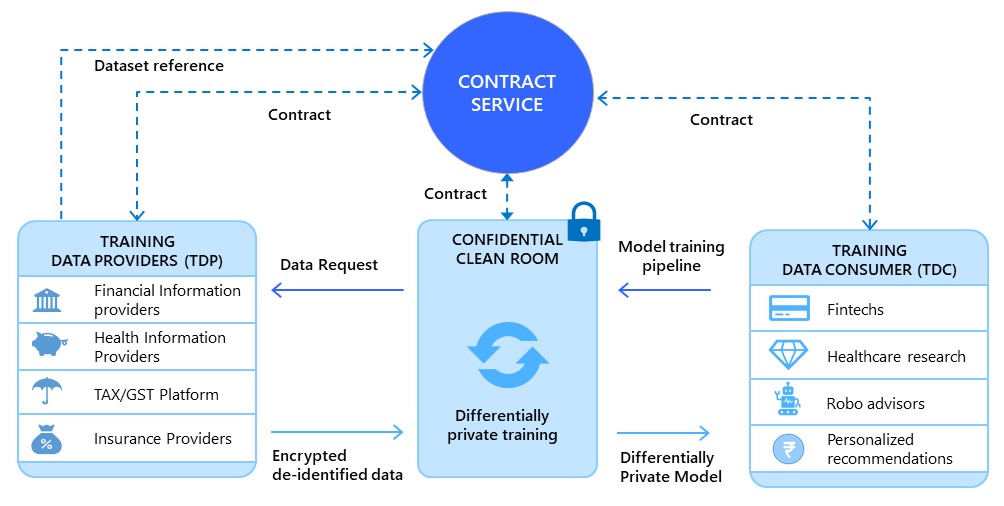Architecture
Traditional data sharing processes often involve complex trust-building, legal negotiations, and technical setups, leading to opacity and market imbalances favouring large organizations. The DEPA training framework is a techno-legal solution that aims to democratize and streamline this process by enabling secure, compliant, and efficient sharing of diverse datasets across organizations to train accurate, fair, and unbiased AI models.

Participant Registration. TDPs and TDCs register with a central registry setup by the SRO. After SRO verifies their identities, TDPs and TDCs sign a common agreement, accepting the terms of participation in the framework.
Dataset Registration. TDPs register their datasets with a contract service setup by the SRO along with the terms of availability. At the same time, TDPs encrypt their datasets with their own encryption keys hosted in their key management systems (KMS) and host endpoints where encrypted datasets can be accessed.
Dataset Discovery. At any time, TDCs can query the contract service for available datasets. TDCs can use sample datasets provided by the TDPs to develop their initial models.
Contracts. Once a TDC has identified the datasets they wish to use, the TDC enters into a digital contract with the TDPs. Contract may be two-party (between a TDC and a single TDP), or multi-party (between a TDC and multiple TDPs). Contracts specify the datasets being shared and terms under which sharing is permitted. Terms include security and privacy constraints in line with standards set by the SRO, the purpose for which datasets are being shared, period of the contract, and payment terms.
Digital Contract Signing. After agreeing on a contract, TDPs and TDCs digitally sign the contract using their long term digital identities and register signed contract with the contract service. A contract is said to be valid only when all participants in the contract have signed.
Confidential Clean Rooms., The TDC (or a CCR provider that acts on behalf of the TDC) sets up a confidential clean room (CCR) with a set of signed contracts and additional configuration describing the model that the TDC wishes to train (e.g., initial weights, hyperparameters etc). CCRs are secure environments that provide hardware based security and privacy for datasets and models. The CCR is deployed with a privacy-preserving analytics and ML framework certified by the SRO.
Key Release. The CCR obtains encryption keys for TDP datasets from the TDPs KMS. The TDP KMS release keys to the CCR after verifying CCR attestation reports.
Training. After retrieving keys, the CCR decrypts the dataset, and trains the model with privacy guarantees, ensuring that raw datasets are never exposed to the TDC or any other entity, such as the CCR provider or cloud provider acting on behalf of the TDC.
Payment. After training is complete, the CCR notifies the contract service, which can trigger external payment services to trigger payments to the TDPs in real time as per the terms of the contract.
This framework aims to meet the principles of zero trust and privacy-by-design. The CCR ensures that raw datasets are never revealed to the TDC or any entity such as the CCR provider or the cloud provider acting on behalf of the TDC. Also, the TDC's model architecture or weights are not revealed to the TDPs.
We recognize that no technology or framework is perfect. Some TDCs and TDPs may act with malicious intent. Vulnerabilities may be discovered in contract services and CCRs implementations. New privacy technologies might emerge that improve current best practices. Instances of the DEPA training framework will be designed for resiliency in the face of such changes.